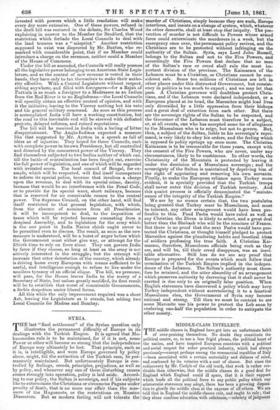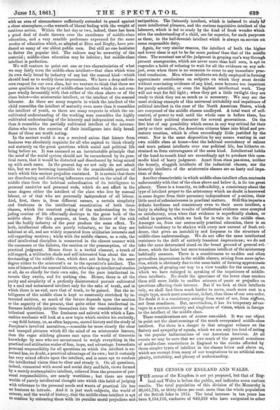MIDDLE-CLASS INTELLECT.
THE middle classes in England have got into an unfortunate habit of over-praising themselves. No doubt they constitute the political centre, or, to use a less frigid phrase, the political heart of the nation, and have inspired European countries with a political and social respect for sober practical industry, which had always previously—except perhaps among the commercial republics of Italy —been associated with a certain materiality and dulness of mind, and confessed by its votaries with a sort of shame. But since the rediscovery by Mr. Carlyle of the old truth, that work is rather cre- ditable than otherwise, that the middle classes do a good deal for England which England could ill spare, that it is their support which lends all the political force to any public policy which our aristocratic statesmen may adopt, there has been a growing disposi- tion to glorify the middle class at the expense of all others. We are told that in England the middle classes rule, and ought to rule ; that Dissenters. But as modern feeling will not tolerate the they alone combine education with substance,—sobriety of judgment
with an area of circumstance sufficiently extended to guard against a close atmosphere,—the warmth of liberal feeling with the weight of cautious action. Within the last day or two, indeed, there has been a good deal of doubt thrown over the excellence of middle-class education, and a very sensible preference expressed for the same modes of education which, as adopted at Eton and Rugby, have pro- duced so many of our ablest public men. But still no one hesitates to flatter the popular idol. The culture may be unworthy of the material; middle-class education may be inferior; but middle-class intellect is perfection.
We will venture to point out one or two characteristics of what we may fairly term the middle-class intellect—that class which wins its own daily bread by industry of any but the manual kind—which should lead us to modify these impressions. We have a deep and sin- cere respect for our own class, but we venture to think that there are some qualities in the type of middle-class intellect which do not com- pare wholly favourably with that either of the class above or of the class below—the aristocratic intellect, or the intellect of the manual labourer. As there are many respects in which the intellect of the child resembles the intellect of maturity even more than it resembles the intellect of youth, so there are many respects in which the un- cultivated understanding of the working man resembles the highly cultivated understanding of the leisurely and independent man, more than it resembles the partially cultivated intellect of the interme- diates who turn the exercise of their intelligence into daily bread. Some of these are worth noting.
In the ancient world it was a received axiom that leisure from business was absolutely requisite for all who aspired to think clearly and maturely on the great questions which social and political life bring before us. It was assumed as an incontestable principle that the mind of the social system should not be encumbered by its prac- tical cares, that it would be distorted and discoloured by being mixed up with such cares. In the present day we not only do not admit this, but we are becoming insensible to the considerable portion of truth which this ancient prejudice contained. It is certain that there are discolouring and distorting influences exerted on the mind of the middle class from the habitual subordination of its intelligence to personal anxieties and personal ends, wliich do not affect in the Same degree either the intellect of the class who live by manual labour, or of that who are personally independent of all labour. And, first, there is, from different causes, a certain simplicity and freshness in the intellectual constitution of both these classes, which the constant yoking of the understanding to the jading routine of life effectually destroys in the great bulk of the middle class. For this purpose, at. least, the leisure of the rich and the bodily industry of the poor produce the same effect. To both, intellectual efforts are purely voluntary, so far as they are habitual at all, and are widely separated from utilitarian interests and self-regarding motives ; while with the middle classes, as a rule, the chief intellectual discipline is connected in the closest manner with the successes or the failures, the caution or the presumption, of the practical judgment. Hence there is a turbid element, a touch of self-regard, a utilitarian shade and selfinterested bias about the un- derstanding of the middle class, which does not belong in the same degree either to the aristocrat's or to the operative's intellect. The man of leisure, and the manual labourer, who take up intellectual studies at all, do so chiefly for their own sake, for the pure intellectual in- terests they excite, and for nothing else. Hence, there is all the purity and simplicity of a perfectly disinterested pursuit cultivated by a cool and unharassed intellect only for the sake of truth, and in which there is no end, save that of truth, to be gained. But the in- telligence of the middle class is kept so constantly stretched by in- terested motives, so much of the future depends upon the caution or the sagacity of the present, that quite other than intellectual in- fluences habitually intrude themselves into the consideration of in. tellectual questions. The freshness and naivete with which a Lan- cashire mechanic will look at a new topic which excites his curiosity, —say field botany, or, as often happens, sacred history and the study of josephus's involved narratives,—resemble far more closely the clear and tranquil pictures which fill the mind of an aristocratic learner, than the eager sidelong glances cast upon the world of theoretic knowledge by men who are accustomed to weigh everything in the practical and utilitarian scales of fear, hope, and advantage. Immediate personal responsibility for all questions on which the intellect is ex- ercised has, no doubt, a practical advantage of its own; but it certainly has very mixed effects upon the intellect, and is more apt to confuse the intellectual vision than to clear and steady it. On all questions, indeed, connected with moral and social duty and faith, views formed by a merely contemplative intellect, relieved from the pressure of per- sonal responsibilities, are nearly worthless ; but there are many worlds of purely intellectual thought into which this habit of judging with reference to the personal needs and wants of practical life has no business to intrude. And it is just such subjects, the world of science, and the world of history, that the middle class intellect is apt to confuse by colouring them with its peculiar moral prejudices and antipathies. The I leisurely intellect, which is induced to study by mere intellectual pleasure, and the curious inquisitive intellect of the labourer, which is led to study by the kind of fresh wonder which stirs the understanding of a child, are far superior, for such purposes as these, to the half-feverish intellect which is always on service on some responsible duty.
Again, for very similar reasons, the intellect of both the higher and lower class is apt to be far more patient than that of the middle class. The constant use of the judgment in groping one's way through present emergencies, which are never more than half seen, is apt to engender a habit of refusing to wait for all the evidence on any sub- ject, even when there is no occasion to come to any immediate prac- tical conclusion. Men whose intellects are daily employed in forming approximate conclusions on subjects on which they must decide without convincing evidence of any kind, soon become too impatient for purely scientific, or even the highest intellectual work. They will not wait for full light ; when they get a little twilight they are ready to think they see as much as is necessary. We may see the most striking example of this universal irritability and impatience of political intellect in the case of the North American States, which are composed of the middle classes unalloyed. A total want of self- control, of power to wait until the whole case is before them, has marked their political character for several generations. On the first hint of any possibility which seems in any way critical for their party or their nation, the American citizens blaze into blind and pre- mature emotion, which Is often exceedingly little justified by the event. Nor is the same disposition by any means wanting in our own middle class at home—but the habitual ascendancy of calmer and more patient intellects over our political life, has hitherto re- strained us from extravagance of the same kind. Intellectual habits of the hand-to-month kind are exceedingly apt to produce this spas. medic kind of hasty judgment. Apart from class passions, neither the homely, sluggish intellects of the industrial classes, nor the leisurely intellects of the aristocratic classes are so hasty and impa. tient of delay.
Another characteristic in which middle-class intellect often contrasts unfavourably with that of the class above and below it, is its too great pliancy. There is a tenacity, an inflexibility, a consistency about the type of intellect proper to the aristocracy which no doubt is borrowed in some degree from their pecuniary independence of p osition, their little need of submissiveness in practical matters. Still this imparts a definite hardiness and consistency even to their mere intellect, a fixity in abiding by the results of intellectual evidence once accepted as satisfactory, even when that evidence is superficially shaken, or called in question, which we look for in vain in the middle class. Amongst us, from our necess arily practical education, there is an habitual tendency to be shaken with every new current of fresh evi- dence, that gives an instability and limpness to the structure of middle-class understandings. We do not offer the same intellectual resistance to the drift of entirely transient impressions; we do not take the same determined stand on the broad ground of general evi- dence,
which the lazier but more tenacious intellect of the aristocracy habitually assumes. There is a sensitiveness to sudden and often groundless impressions in the middle classes, arising from mere infec- tion, which is obviously due to the same habit of forming approximate judgments, of groping our way to a view tenable for the moment, on which we have enlarged in speaking of the impatience of middle- class intellects. No doubt the ignorance of the lower class renders them still more liable to sudden seizures of panic or prejudice on questions affecting their interest. But if we look at their intellects only, we shall find them much harder to move, much more cast in a single type, much more consistent, in fact, than those of our own order. No doubt it is a consistency arising from want of use, from stiffness, not from steadiness. But, nevertheless, it has its temporary advan- tages in a certain sincerity and singleness of vision, which is foreign to the intellect of the middle class.
These considerations are of course one-sided. It was our object to point out the short-comings of the much overpraised middle-class intellect. For there is a danger in that arrogant reliance on the flattery and sympathy of equals, which we are only too fond of noting in the popular hallucinations of our American brethren. At all events we may be sure that we owe much of the general soundness of middle-class convictions in England to the checks afforded by those simpler types of intellect in the classes below and above us, which are exempt from many of our temptations to an artificial com- plexity, irritability, and pliancy of understanding.































 Previous page
Previous page